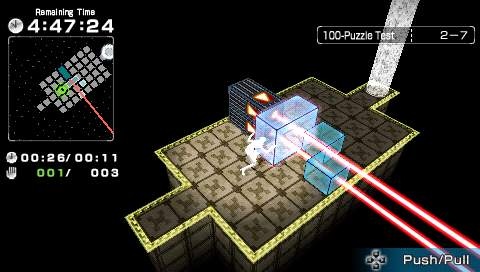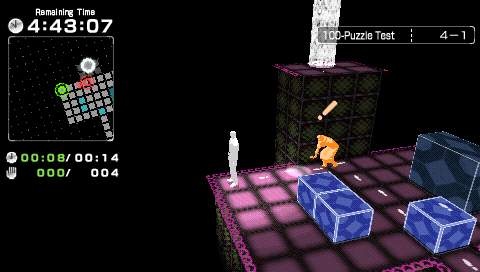While many puzzle games like to carry an intellectual air, few have been as blunt about it as last year's PQ: Practical Intelligence Quotient. As a sort of parallel to the popular brain-training games, PQ put you through a series of 100 three-dimensional logic puzzles. Based on specifics of your performance, such as speed and overall efficiency, you were assigned a PQ score, a sort of meta-intelligence rating. While the puzzles themselves could be deliciously challenging exercises in logic and spatial relations, there wasn't enough context for the PQ scores to really mean anything. That there was a loophole that made padding your PQ score a trivial matter didn't help, either. These issues and more are addressed in PQ2, which accomplishes much of what a sequel should. It bolsters what was good about the original with new, complementary gameplay mechanics and modes, while fine-tuning the parts that didn't quite work.

Every puzzle in PQ2 is essentially a 3D assembly of blocks floating in a nebulous void. There is a starting and finishing point, and your objective is to guide your avatar, a white, featureless silhouette of a person, from one to the other while taking as little time, and making as few unnecessary moves, as possible. The simplicity of your point-A-to-point-B objective is consistent, but your means of accomplishing it is not. Your avatar's abilities are limited to walking around, stepping up a single block level, picking up smaller blocks, and pushing around larger ones. The puzzlesmiths behind PQ and PQ2 have obviously gotten better at what they do, as the puzzles here are more inventive in their essential design, and the type of challenge you're presented with can vary widely from puzzle to puzzle.
PQ2 also introduces some new concepts that help tease the brain even further. There are now glass blocks that will shatter if dropped any further than the level you're currently standing on, a quality that can work for or against you, depending on the puzzle. Lasers can also pass through these blocks, which comes into play on more than one occasion. You'll find color-coded portable lifts that rise only when certain level conditions are met, such as when a pressure-sensitive floor panel is activated, or when a special switch-block is activated by a laser. In addition to the roaming security guards found in PQ, there are now Holmesian detectives who will walk a set path. The difference is that when detectives come across a block that you've stepped on recently, they'll start following your path, and you'll have to start the puzzle over if they catch up with you. Teleporters, which can be pushed and pulled around the level, can be used to access otherwise inaccessible areas, and their limited mobility proves key to solving several puzzles. Learning the rules that govern these various gadgets can take a while, and there are puzzles with so many different moving parts that it can be difficult to know where to start. The quality of the actual puzzles, though, makes these issues worth it.

In addition to refining the actual gameplay, PQ2 brings several new ways to play the game. You can still go through the main 100-puzzle test, which benefits from an autosave feature that makes it tougher to pad out your score. It also makes the PQ score more meaningful by updating your current PQ score between puzzles, and by providing a short explanation of what your PQ score actually means once you've completed the test. In addition to this roughly five-hour challenge, there is a quick, 10-minute test consisting of just five puzzles, as well as a series of individual theme tests. As in the original, you can upload your score in the 100-puzzle test to an online leaderboard, though you can also download a weekly puzzle, download custom puzzles created by other players, or upload puzzles you've created with the game's built-in level editor. With so many puzzles and so many different ways to play, it's easy to lose a lot of time to PQ2.
While PQ2 would've seemed more impressive were it not following Crush, a PSP puzzle game with a much more conceptually challenging conceit, but PQ2 still stands on its own as a wholly capable puzzler. While slicker presentation might've been nice, the game wisely focuses on the elements that are really important to the PQ experience, and it's a more satisfying puzzle game for it.